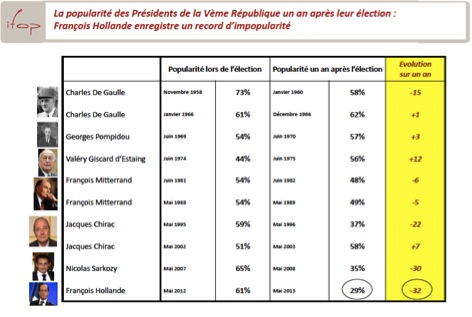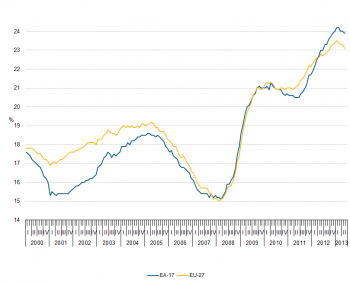After spending several weeks in France, the mood in France is far from being positive. A series of factors have contributed to some type of national negativism affecting any types of creativity and motivation to drive the country out of this crisis. Rightly so, France is not at its economic, financial and societal peak with a 10.8 percent unemployment rate – an all time high in 15 years –, and a budget deficit for more than three decades flirting with 90 percent of its GDP. The country has been in search of ‘compétitivité’ for several years now. From a societal standpoint, the old and traditional model of assimilation is showing signs of weakness creating a certain social malaise across socio-economic classes.
But France remains in better shape than many of its southern neighbours. Greece, Spain, Portugal and Italy are all going through not only fiscal and economic crisis, but as well political crisis. It seems than neither state can solve their respective crisis through their politics. Politicians in southern European countries have lost their legitimacy – see the Lagarde’s list, corruption cases, and other types of nepotism – and citizens are becoming desperate. Ultimately, the southern European mood is far from being bright and rosy.
Going back to France, four themes have absolutely been recurrent in the media and lodging in the Frenchmen/women mouths these last months. The first one is the weather. It seems like a silly topic, but winter has been too long. The climatic conditions have been quite rough throughout the country. The crops – corns and others – are not at the level of growth where they should be. This may have an economic impact for the agricultural world – but this remains to be seen –. This was until early July. Now, it has become the opposite. The topic of global warming is certainly present on the lips of French citizens.
The second issue, and what could be described as a national hobby, is the Holland-bashing. After being elected in May 2012 with 51.7 percent of the votes, the popularity of the President has been in free-fall and lodges well below 30 percent. Among all the Presidents of the Fifth Republic François Hollande is the one with the largest decrease in its popularity after only one year in power. According to an Ifop poll, President has lost 32 points starting in May 2012 at 61 percent and 29 percent in May 2013. Even President Sarkozy was not as unpopular as his successor a year after. Despite a sluggish and slow economic recovery, President Hollande has not received recognition for several policies: labour market reform deal in early January; the war in Mali; and gay marriage. However, his style of ‘normal president’ plus the error around the high-level of taxation have seriously cost him.

Source: IFOP. 2013. “La popularité des Présidents un an après leur élection.” 4 Juillet.
The third issue has been about a series of scandals affecting the credibility of the French political class with the Tapie and Cahuzac cases. Jérôme Cahuzac, budget minister in the Hollande’s government, was accused and proven guilty of having savings in safe- heavens like Switzerland. Only have pressures from the Socialist members, did he realize that what he has done is unethical and especially illegal. The Cahuzac is remerging with new allegations about the handeling of the crisis by the current government as well as who knew what. This crisis within the Hollande’s government is an absolute stain on the credibility of the leadership. The second case, or the Tapie case is a complex legal battle between Bernard Tapie, a self-made politician and businessman, around the selling of the company Addidas back in 1995 after driving the company into bankruptcy. The investigation taking place was based on the suspicion of involvement in fraud after receiving a 430 millions Euros compensation by the French state under the Sarkozy’s government. Both cases are scandals directly intertwined in the highest spheres of the Fifth Republic. One is directly hurting the current government, while the other could cost a possible re-election of Sarkozy in 2017. There are illustration of the constant battle against corruption, lies and nepotism even in advanced democracies.
heavens like Switzerland. Only have pressures from the Socialist members, did he realize that what he has done is unethical and especially illegal. The Cahuzac is remerging with new allegations about the handeling of the crisis by the current government as well as who knew what. This crisis within the Hollande’s government is an absolute stain on the credibility of the leadership. The second case, or the Tapie case is a complex legal battle between Bernard Tapie, a self-made politician and businessman, around the selling of the company Addidas back in 1995 after driving the company into bankruptcy. The investigation taking place was based on the suspicion of involvement in fraud after receiving a 430 millions Euros compensation by the French state under the Sarkozy’s government. Both cases are scandals directly intertwined in the highest spheres of the Fifth Republic. One is directly hurting the current government, while the other could cost a possible re-election of Sarkozy in 2017. There are illustration of the constant battle against corruption, lies and nepotism even in advanced democracies.
The last one is about the increasing acceptability of Front National, extreme-right wing party, as a solution to the French crises. Marine Lepen, her president, is surfing on the wave of dissatisfaction of the French with their governments, the rise of inequality, the perpetual fear of globalization, and the supposedly rise of immigrants. With the perceived failure of the mainstream parties – right and left – to deal with these series of crises since 2008, the Front National has become the third way and for many possibility the solution to all France’s problems. This rise and acceptability of extreme-right parties in Europe is real threat to the quality of European democracy and is fuelled by ignorance and fear. Bringing such party to the head of France would not solve any problems. Mainstream parties have to tackle such problem by stopping flirting with them and rejecting them as former France President Chirac did during the 2002 elections.
Unfortunately, this selection of problems is not reflecting the important changes tacking place in Europe. First, Croatia is the latest country to join the EU and has received very little attention. Second, the EU and its member states just agreed on a revision and reform of the Common Agricultural Policy (CAP) making it less rigid, less costly, and greener. Its budget has been decreased by 7.3 percent for the next budget of 2014-2020. This reform has taken over 2 years of negotiations. This new PAC is increasing the autonomy of each member state in regulating its agricultural sector. For a country like France with a large agricultural sector, such topic was inexistent and poorly analyzed in mainstream media. Third, the Summit on Youth and SME (Small and Medium Enterprise) did not get the attention of the French public, again. The EU is increasingly trying to tackle the pauperization of European youth. Solving these problems of pauperization and high unemployment of European youth is probably one of the most important. At the regional level, the future of the Union and Euro are directly intertwined with this problem. At the national level, rise of extremes – right and left – will ensue affecting the qualities of European democracies.

Source: Eurostat. Figure 5: Youth unemployment rates, EU-27 and EA-17, seasonally adjusted, January 2000 – May 2013 (%)
Last but not least, the transatlantic meeting around the Transatlantic Trade and Investment Partnership (TTIP) have finally kicked in. The only discussion taking place around it, domestically, was about Hollande’s comment on French cultural exceptionalism leading to a furious clash between Barroso, President of the Commission, and the President. Yes, protecting European culture is an important matter, but discussing the future of the mother of all free trade agreement is vital to. Topics like GMOs must be discussed at national level and should not be left to national and European politicians. It is about time for Frenchmen/women to open up their eyes and re-become active citizens. Democracy is not a top to bottom process, but the opposite. We may have forgotten this golden rule.